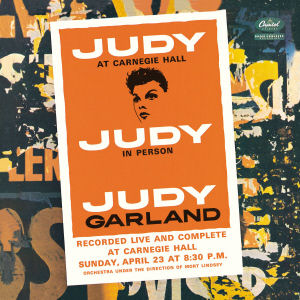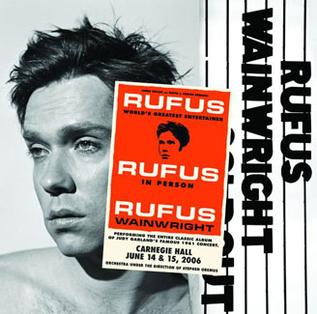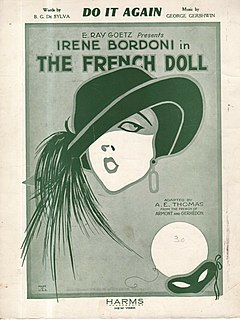Related Research Articles
"People Will Say We're In Love" is a show tune from the Rodgers and Hammerstein musical, Oklahoma! (1943). In the original Broadway production, the song was introduced by Alfred Drake and Joan Roberts.

Till The Clouds Roll By is a 1946 American Technicolor musical film produced by Metro-Goldwyn-Mayer. It is a fictionalized biopic of composer Jerome Kern, portrayed by Robert Walker. Kern was originally involved with the production, but died before it was completed. It has a large cast of well-known musical stars of the day who appear performing Kern's songs. It was the first in a series of MGM biopics about Broadway's composers; it was followed by Words and Music, Three Little Words, and Deep in My Heart.

Words and Music is a 1948 American biographical musical film loosely based on the creative partnership of the composer Richard Rodgers and lyricist Lorenz Hart. The film stars Mickey Rooney as Hart and Tom Drake as Rodgers, along with Janet Leigh, Betty Garrett, Ann Sothern and numerous musical stars. It was the second in a series of MGM biopics about Broadway composers; it was preceded by Till the Clouds Roll By and followed by Three Little Words and Deep in My Heart.

Judy at Carnegie Hall is a double-LP live recording of a concert by Judy Garland at Carnegie Hall in New York, with backing orchestra led by Mort Lindsey. This concert appearance, on the night of Sunday April 23, 1961, has been called "the greatest night in show business history".
"The Gypsy in My Soul" is a popular song written for the 50th anniversary of the University of Pennsylvania Mask and Wig show in 1937 by two Penn graduates, Clay Boland and Moe Jaffe. Boland wrote the music and Jaffe the lyrics. Although both men had long since graduated, it had become the practice at the time for professionals, rather than students, to compose songs for the show.
"I'll Remember April" is a popular song and jazz standard about a romantic relationship ending. The lyric uses the seasons of the year metaphorically to illustrate the growth and death of a romance. The lyric also uses the ideas of the hours in a day and the flames of a fire to illustrate a relationship growing stronger and subsequently losing strength. Another interpretation is the use of spring to express the loves that were had in youth and remember them when the autumn of life arrives with affection and nostalgia, smiling: "I'll remember April and I smile". The song has been described as one which makes use of nostalgia, with music written in 1941 by Gene de Paul, and lyrics by Patricia Johnston and Don Raye. It made its debut in the 1942 Abbott and Costello comedy Ride 'Em Cowboy, being sung by Dick Foran.
"This Can't Be Love" is a show tune and a popular song from the 1938 Rodgers and Hart musical The Boys from Syracuse when it was sung by Eddie Albert and Marcy Westcott. The lyrics poke fun at the common depiction of love in popular songs as a host of malignant symptoms, saying, "This can't be love because I feel so well."
"It Could Happen to You" is a popular standard with music by Jimmy Van Heusen and lyrics by Johnny Burke. The song was written in 1943 and was introduced by Dorothy Lamour in the Paramount musical comedy film And the Angels Sing (1944).
"I May Be Wrong " is a popular song. The music was written by Henry Sullivan, the lyrics by Harry Ruskin. The song was published in 1929 and it was included in the musical revue Murray Anderson's Almanac which ran for 69 performances at Erlanger's Theatre on Broadway in 1929. It is said that the song was written on-demand for John Murray Anderson.
"When You're Smiling" is a popular song written by Larry Shay, Mark Fisher and Joe Goodwin in 1928. It bears resemblance to the Spanish Canción "Amapola" by José María Lacalle García. Early popular recordings were by Seger Ellis (1928), Louis Armstrong (1929), and Ted Wallace & His Campus Boys (1930).
"How About You?" is a popular song composed by Burton Lane, with lyrics by Ralph Freed. It was introduced in the 1941 film Babes on Broadway by Judy Garland and Mickey Rooney.
"Who Cares?" is a song composed by George Gershwin, with lyrics by Ira Gershwin, written for their 1931 musical Of Thee I Sing. It was introduced by William Gaxton and Lois Moran in the original Broadway production.
"Get Happy" is a song composed by Harold Arlen, with lyrics written by Ted Koehler. It echoes themes of a Christian evangelical revivalist meeting song.
"I Wish I Were in Love Again" is a show tune from the 1937 Rodgers and Hart musical Babes in Arms. In the original show, Dolores, the Sheriff's daughter, talks to Gus, her former boyfriend, who tries to woo her unsuccessfully. They then sing about how they do not care that their relationship is over. The song was omitted from the 1939 film version.
"Johnny One Note" is a 1937 show tune from the 1937 Rodgers and Hart musical Babes in Arms, where it was introduced by Wynn Murray. Judy Garland sang it in the Rodgers & Hart biopic Words and Music (1948).
"(You'd Be So) Easy to Love" is a popular song written by Cole Porter for William Gaxton to sing in the 1934 Broadway show Anything Goes. However Gaxton was unhappy about its wide vocal range and it was cut from the musical. Porter re-wrote it for the 1936 film Born to Dance, where it was introduced by Eleanor Powell, James Stewart, and Frances Langford under its alternate title, "Easy to Love". The song was later added to the 1987 and 2011 revivals of Anything Goes under the complete title "You’d Be So Easy to Love".
"The Sweetest Sounds" is a popular song, with words and music written by Richard Rodgers for the 1962 musical No Strings. The song opens and closes the show for characters Barbara Woodruff and David Jordan, performed by Diahann Carroll and Richard Kiley in the original Broadway theatre production and subsequent cast recording.

Rufus Does Judy at Carnegie Hall is the sixth album by the Canadian-American singer-songwriter Rufus Wainwright, released through Geffen Records in December 2007. The album consists of live recordings from his sold-out June 14–15, 2006, tribute concerts at Carnegie Hall to the American actress and singer Judy Garland. Backed by a 36-piece orchestra conducted by Stephen Oremus, Wainwright recreated Garland's April 23, 1961, concert, often considered "the greatest night in show business history". Garland's 1961 double album, Judy at Carnegie Hall, a comeback performance with more than 25 American pop and jazz standards, was highly successful, initially spending 95 weeks on the Billboard charts and garnering five Grammy Awards.

"Do It Again" is an American popular song by composer George Gershwin and lyricist Buddy DeSylva. The song premiered in the 1922 Broadway show The French Doll, as performed by actress Irène Bordoni.

"If Love Were All" is a song by Noël Coward, published in 1929 and written for the operetta Bitter Sweet. The song is considered autobiographical, and has been described as "self-deprecating" as well as "one of the loneliest pop songs ever written".
References
- ↑ Suskin, Steven (2010). Show tunes: the songs, shows, and careers of Broadway's major composers. Oxford University Press. p. 102. ISBN 9780199742097 . Retrieved March 8, 2011.
- ↑ Hemming, Roy (1999). The Melody Lingers On: The Great Songwriters and Their Movie Musicals . Newmarket Press. p. 249 . Retrieved March 8, 2011.
- ↑ "Obituary: Anne Francine" . The Independent . Independent Print Limited. December 18, 1999. Archived from the original on 2022-05-07. Retrieved March 9, 2011.
- ↑ Block, Geoffrey (2006). The Richard Rodgers Reader. New York: Oxford University Press. p. 75. ISBN 0195313437.
- ↑ "Catalog of Copyright Entries". Catalog of Copyright Entries. 1941. Retrieved September 30, 2018.
- ↑ "Internet Movie Database". imdb.com. Retrieved September 30, 2018.
- ↑ "DVD Talk". dvdtalk.com. Retrieved October 1, 2018.
- ↑ Macfarlane, Malcolm (2009). Perry Como - A Biography and Complete Career Record. Jefferson, North Carolina: McFarland & Company. pp. 43–44. ISBN 978-0-7864-3701-6.
- ↑ "SecondHandSongs". secondhandsongs.com. Retrieved October 1, 2018.
- ↑ "The Online Discographical Project". 78discography.com. Retrieved October 1, 2018.
- ↑ "Discogs.com". Discogs.com. Retrieved October 1, 2018.
- ↑ "Discogs.com". Discogs.com. Retrieved October 1, 2018.
- ↑ "Discogs.com". Discogs.com. Retrieved October 1, 2018.